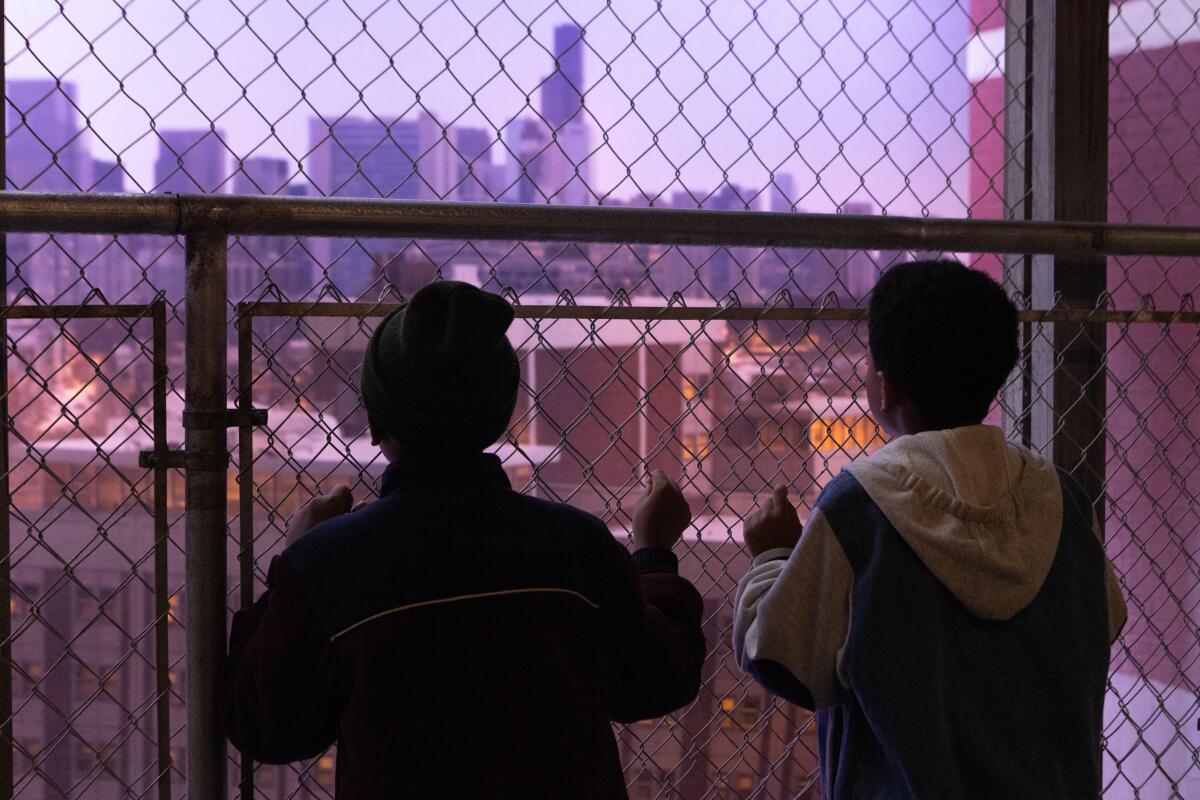In the well-researched ‘We Grown Now,’ a family hangs tough in Chicago’s projects

- Share via
A close-knit Chicago family of meager means and hesitant dreams grapples with their sense of home in the plaintive indie drama “We Grown Now,” from writer-director Minhal Baig. Set in the high-rises of the Cabrini-Green housing project in 1992, when the beleaguered complex’s decline was palpable, it sounds like a recipe for doleful poverty-gazing. But in Windy City native Baig’s solid hands, it’s a resolutely poetic, at times even golden-hued portrait of lives unafraid to hope amid growing despair.
Our way in is via grade-school besties Malik (Blake Cameron James) and Eric (Gian Knight Ramirez), spirited kids fueled by a love of exploration (sometimes during school hours), a commitment to perfecting their playground “jump” onto piled mattresses cadged from empty units and a running commentary of jokes, teasing and Bulls analysis. (This is the rare period film devoid of needle-drop music cues, Baig preferring Jay Wadley’s flinty string score as accompaniment.)
Malik, who boasts a smile you want more of, is also an active dreamer, intent on showing Eric — whose outlook can lean cynical, despite an attentive single dad (Lil Rel Howery) pushing him academically — how the blotches of a moldy, cracked ceiling could be a constellation of stars. And with a little help from the wonder and warmth of Pat Scola’s child’s-perspective cinematography and the young leads’ quietly assured portrayals, we can see it, too.
The institutional neglect isn’t hidden. It’s just that human closeness reigns. In their modest, comfortable apartment, Malik and his younger sister get unwavering love, support and life wisdom from their hard-working mom Dolores (Jurnee Smollett) and ever-sewing grandmother Anita (a sublimely matriarchal S. Epatha Merkerson), whose elegant window curtains, made when she first moved to Cabrini-Green decades ago from an inhospitable Mississippi, are a source of beautifying pride.

Yet even this multigenerational Black family’s well-tended sanctuary isn’t immune to a neighborhood’s worsening safety and a demonizing city authority’s overreach. When a 7-year-old boy falls victim to gun violence on his way to school (the real-life case of Dantrell Davis, whose 1992 killing galvanized the city), ID cards for residents are suddenly a requirement, followed by unnecessarily dehumanizing police raids. It all smacks of undeserving punishment for being a problem area on Mayor Richard Daley’s watch.
Key to Baig’s balance of coming-of-age energy and realism is a pivotal sequence. It starts with the boys skipping class for an epic, joyful trip to the city’s Art Institute, including a wide-eyed introduction to Walter Ellison’s bustling 1935 painting “Train Station” depicting white vacationers on one platform and Black travelers uprooting their lives on another. The day’s exhilaration is short-lived, though, when Malik returns home to be confronted by a terrified mom, her tearful, angry lashing out suggesting that her increasing worry and her son’s boundless taste for freedom will soon become incompatible. (Credit goes to Smollett’s aching illustration of what exhaustion on top of exhaustion in a single mom looks like.)
Later, when a practical solution to the household’s unease presents itself, the movie’s themes of security and mobility — not always subtle, but thoughtfully threaded — achieve a poignancy. We watch the hard lessons of grandma Anita’s Great Migration finally register in a mother and son who have only ever known one nest. And in Malik’s case, it’s a nest fortified by an unshakable friendship he can’t fathom losing.
Of course, the truth hovering over this sweet and sad tale, the product of Baig’s prodigious research, is that Cabrini-Green, its last building demolished in 2011, is itself only a memory of community. A onetime dream of civic progress, it held residents who made it their home for as long as they could. In its sincerity of vision, “We Grown Now” is loving testament to them.
'We Grown Now'
Rating: PG, for thematic material and language
Running time: 1 hour, 33 minutes
Playing: Opens Friday, April 19 at AMC Century City, Cinemark Baldwin Hills
More to Read
Only good movies
Get the Indie Focus newsletter, Mark Olsen's weekly guide to the world of cinema.
You may occasionally receive promotional content from the Los Angeles Times.










